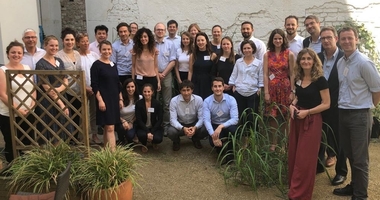The first meeting of the European Peer Learning Group on Corporate Climate Strategies was held on the 4th and 5th of June in Berlin. The meeting was organized by the UN Global Compact Local Networks of Germany, France, Spain, Italy, Switzerland and Denmark. The aim was to promote dialogue among companies from different national contexts and foster sharing corporate experiences on the importance of developing corporate climate strategies – as well as setting ambitious climate targets in line with the Paris Agreement’s objective of limiting global warming to +1.5° C.
4 Italian companies - A2A, Artsana, Ferrovie dello Stato, Snam - already committed to developing a corporate climate strategy attended the meeting. During the event was also explored and discussed the importance for companies of setting Science-Based Targets, aligned with the above-mentioned 1.5 ° C global objective.
The meeting was highly interactive, with sharing of experiences and working groups. All activities started with the identification of the drivers that push each company to develop a climate strategy: top management commitment, brand credibility and company reputation, stakeholders' expectations and transparency, increase of corporate competitiveness and market opportunities.
The experts of Sustainable – consultants of the German Local Network on climate issues, who moderated the meeting – developed and presented the corporate Climate Strategy 2.0. The strategy is based on the following characteristics: long term time horizon (5-15 years); targets aligned with the global objective of limiting global warming to +1.5° or at least below +2°C above pre-industrial levels; targets encompassing companies’ indirect emissions throughout the entire value chain (also defined Scope 3 in the Greenhouse Gas Protocol, which provides measurement standards for emissions); strategic orientation integrated with other corporate functions (purchasing, R&D, product design). In response to this model, the participants identified possible challenges and solutions.
Concerning the definition of targets on climate issues, participants picked out the following possible challenges: setting the Science-Based Targets (SBTs), finding adequate data, guaranteeing the company’s internal commitment to the objectives, financing the targets, avoiding greenwashing. Among other things, participants proposed the following solutions to these challenges: benchmarking with other companies that have set more ambitious targets and accepting that the SBTs are a path of progressive improvement; creating databases and collecting best practices; increasing corporate information and awareness on these issues; promoting collaboration between different company sectors; developing the green bond tool and, in general, giving priority to investments with limited environmental impact; being transparent and identifying targets that are easy to communicate externally.
For the implementation phase, participants stressed the challenges of involving employees in the process, keeping the internal focus on climate issues, engaging the entire value chain also at the local level, avoiding conflict of interest with other business objectives. Possible solutions included: creating employee involvement systems (ambassadors, volunteers, incentives), raising awareness among top and middle management, organizing awareness activities also at the local level (sustainability awards), translating CSR/Climate objectives into business terms, including sustainability priorities in company systems and financing plans.
The transparency and comparability of results, the lack of awareness of other departments other than those dealing with climate or CSR, the assessment of impacts on the life cycle of a product have been identified as major challenges in relation to the measurement of results. Solutions suggested included: using GRI standards or individual measurements, improving internal communication, aligning financial/non-financial dimensions in company reporting, highlighting opportunities arising from adopting climate objectives throughout the product life cycle, and developing guidelines.
The presentation of corporate experiences allowed a wide space for debate, interaction and learning among the participants of the Peer Learning Group, who particularly appreciated the dynamics of peer exchange and debate.
At the end of the meeting, participants indicated thematic priorities for the next Peer Learning Group 2020: from examining the theme of circular economy more closely to preparing materials on climate strategy for companies’ internal use and focusing on the challenges identified during group work.
For more information on this activity, please contact:

